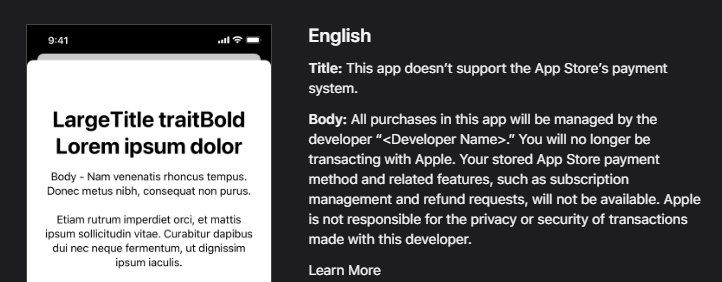To help bring an end to wrangling with Dutch regulators that stretched over the last several months, today, Apple published a new version of its App Store rules that allow local dating apps to take payments through third-party processors. Until now, its proposals to comply with a December ruling mandating the change had not satisfied the Netherlands Authority for Consumers and Markets (ACM) and earned Apple 50 million euros worth of fines.
Among three key changes, the one that jumps out is Apple giving up on its insistence that any app choosing to use an external payment processor has to create and use a separate binary from its existing app. According to Apple, “This change means that developers may include either entitlement in their existing dating app, but still must limit its use to the app in the Netherlands storefront and on devices running iOS or iPadOS.” It also laid out more specifics on how to evaluate non-Apple payment system providers and examples for the pages apps need to present to customers to inform them they’re about to interact with a non-Apple payment service.

The change isn’t coming willingly, though, as Apple’s post for developers still says “we disagree with the ACM’s original order and are appealing it.” In the meantime, Apple will still insist on collecting a 27 percent commission on transactions for apps that link out or use a third-party payment system.
Consistent with the ACM’s order, dating apps that are granted an entitlement to link out or use a third-party in-app payment provider will pay Apple a commission on transactions. Apple will charge a 27% commission on the price paid by the user, net of value-added taxes. This is a reduced rate that excludes value related to payment processing and related activities. Developers will be responsible for the collection and remittance of any applicable taxes, such as the Netherlands’ value-added tax (VAT), for sales processed by a third-party payment provider.
Developers using these entitlements will be required to provide a report to Apple recording each sale of digital goods and content that has been facilitated through the App Store. This report will need to be provided monthly within 15 calendar days following the end of Apple’s fiscal month. To learn about the details that will need to be included in the report, view an example report. Qualifying developers will receive an invoice based on the reporting and will be required to remit payment to Apple for the amount invoiced within 45 days following the end of Apple’s fiscal month. In the future, if Apple develops technical solutions to facilitate reporting, developers will be required to adopt such technologies.
The ACM said on Monday that its next step is to present the policy to “market participants for consultation.” If they accept the terms, then Apple may avoid an escalation in fines.
This dispute and policy-change-under-protest occur as Apple and Google in particular face more scrutiny over the control they exert over apps and payments within their ecosystems. The EU’s Digital Markets Act could require support for external payment processors in all apps after it goes into effect this fall, while South Korea recently passed a similar law.
Related